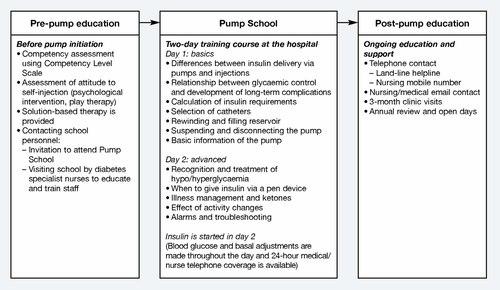A structured educational insulin pump therapy programme: the views of children/young people and their parents
Fatemah M Alsaleh BPharm, MSc, PhD, Felicity J Smith BPharm, MA, PhD, FRPharmS, Rebecca Thompson RSCN, BSc, MSc, Kevin MG Taylor BPharm, PhD, MRPharmS
下载PDF
{"title":"A structured educational insulin pump therapy programme: the views of children/young people and their parents","authors":"Fatemah M Alsaleh BPharm, MSc, PhD, Felicity J Smith BPharm, MA, PhD, FRPharmS, Rebecca Thompson RSCN, BSc, MSc, Kevin MG Taylor BPharm, PhD, MRPharmS","doi":"10.1002/edn.220","DOIUrl":null,"url":null,"abstract":"<p>This study aimed to determine the views and experiences of parents and children regarding the training and services they had received at a London teaching hospital, when the child commenced insulin pump therapy; and to inform future services.</p><p>Face-to-face semi-structured interviews were conducted with children/young people (n=34) aged 5–17 years, using pump therapy, and their parents (n=38). Interviews were audio-recorded, transcribed verbatim and analysed using established qualitative analytical procedures.</p><p>Parents and children/young people had their own concerns on starting pump therapy: constant attachment of the child to an insulin pump and the cannula-insertion procedure respectively, being the greatest concerns. The hospital-based diabetes team supported families to overcome such issues. They provided families with 24-hour telephone contact, contacted schools and nurseries, ran a two-day Pump School at the start of pump therapy and provided ongoing services to ease patients' transition from insulin injections to pumps. The programme and services provided were generally perceived positively by children and parents. However, some limitations were reported and suggestions for improvement were made.</p><p>In conclusion, the insulin pump therapy programme was appreciated by the majority of families, and provided children and their parents with support for easier transition from insulin injections to pumps. As the numbers of young people using pump therapy increase, the results of this study can inform the development of similar services, by considering this programme as a model for establishing such a service in other specialised diabetes centres. Copyright © 2013 FEND. Published by John Wiley & Sons, Ltd.</p>","PeriodicalId":100496,"journal":{"name":"European Diabetes Nursing","volume":"10 1","pages":"25-30"},"PeriodicalIF":0.0000,"publicationDate":"2013-02-27","publicationTypes":"Journal Article","fieldsOfStudy":null,"isOpenAccess":false,"openAccessPdf":"https://sci-hub-pdf.com/10.1002/edn.220","citationCount":"6","resultStr":null,"platform":"Semanticscholar","paperid":null,"PeriodicalName":"European Diabetes Nursing","FirstCategoryId":"1085","ListUrlMain":"https://onlinelibrary.wiley.com/doi/10.1002/edn.220","RegionNum":0,"RegionCategory":null,"ArticlePicture":[],"TitleCN":null,"AbstractTextCN":null,"PMCID":null,"EPubDate":"","PubModel":"","JCR":"","JCRName":"","Score":null,"Total":0}
引用次数: 6
引用
批量引用
Abstract
This study aimed to determine the views and experiences of parents and children regarding the training and services they had received at a London teaching hospital, when the child commenced insulin pump therapy; and to inform future services.
Face-to-face semi-structured interviews were conducted with children/young people (n=34) aged 5–17 years, using pump therapy, and their parents (n=38). Interviews were audio-recorded, transcribed verbatim and analysed using established qualitative analytical procedures.
Parents and children/young people had their own concerns on starting pump therapy: constant attachment of the child to an insulin pump and the cannula-insertion procedure respectively, being the greatest concerns. The hospital-based diabetes team supported families to overcome such issues. They provided families with 24-hour telephone contact, contacted schools and nurseries, ran a two-day Pump School at the start of pump therapy and provided ongoing services to ease patients' transition from insulin injections to pumps. The programme and services provided were generally perceived positively by children and parents. However, some limitations were reported and suggestions for improvement were made.
In conclusion, the insulin pump therapy programme was appreciated by the majority of families, and provided children and their parents with support for easier transition from insulin injections to pumps. As the numbers of young people using pump therapy increase, the results of this study can inform the development of similar services, by considering this programme as a model for establishing such a service in other specialised diabetes centres. Copyright © 2013 FEND. Published by John Wiley & Sons, Ltd.
一个结构化的教育胰岛素泵治疗方案:儿童/青少年及其父母的观点
本研究旨在确定当儿童开始胰岛素泵治疗时,父母和儿童对他们在伦敦教学医院接受的培训和服务的看法和经验;并为未来的服务提供信息。采用泵治疗的5-17岁儿童/青少年(n=34)及其父母(n=38)进行面对面半结构化访谈。访谈录音,逐字抄录,并使用既定的定性分析程序进行分析。父母和孩子/年轻人对启动泵治疗有自己的担忧:孩子对胰岛素泵的持续依恋和插管插入程序分别是最大的担忧。以医院为基础的糖尿病小组支持家庭克服这些问题。他们为家庭提供24小时电话联系,联系学校和托儿所,在泵治疗开始时开办为期两天的泵学校,并提供持续的服务,以减轻患者从胰岛素注射到泵的过渡。儿童和家长普遍认为方案和提供的服务是积极的。然而,报告了一些局限性,并提出了改进建议。总之,胰岛素泵治疗方案得到了大多数家庭的认可,并为儿童及其父母提供了支持,使他们更容易从胰岛素注射过渡到泵。随着使用泵治疗的年轻人数量的增加,本研究的结果可以为类似服务的发展提供信息,通过考虑将该计划作为在其他专业糖尿病中心建立此类服务的模型。版权所有©2013中国农业科学研究院。John Wiley &出版;儿子,有限公司
本文章由计算机程序翻译,如有差异,请以英文原文为准。


 求助内容:
求助内容: 应助结果提醒方式:
应助结果提醒方式:


